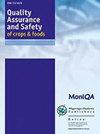Thin layer drying kinetics of lemon verbena leaves: a quality assessment and mathematical modeling
IF 5.3
3区 农林科学
Q1 FOOD SCIENCE & TECHNOLOGY
引用次数: 6
Abstract
The thin-layer drying kinetics of lemon verbena leaves were studied by using a solar cabinet dryer at air tempera-ture (at three levels of 30, 40, and 50°C), air velocity (at three levels of 2, 2.5, and 3 m/s), and mesh tray size (3, 6, and 10 mm). A completely randomized factorial design was used to analyze the effect of independent factors on drying time and essential oil yield. Results showed that all experiments have shorter drying time and higher essen-tial oil content than the shade-drying method. Also, the best drying conditions that led to an optimal essential oil yield (1.73 mL/g DM) involved a lower temperature (30°C) and velocity (2 m/s) and a mesh size of 10 mm. A good adaptation between the experimental and the predicted moisture content was observed, whereby the statistical criteria of R2, root mean square error, and k2 were calculated as 0.99, 0.08, and 0.01, respectively. Practical applicationsIn the current study, the effect of different drying states such as air velocity and drying temperature was studied on the drying behaviors and essential oil contents of lemon verbena leaves. The obtained results can lead us to a suitable drying condition that can be used in the subsequent designation of systems. Also, a mathematical model for the pre-diction of the leaves’ drying kinetics was constructed and evaluated, which could be approached in the drying systems.柠檬马鞭草叶的薄层干燥动力学:质量评价和数学模型
在空气温度(30、40和50°C的三个水平)、空气速度(2、2.5和3m/s的三个级别)和网盘尺寸(3、6和10mm)下,使用太阳能柜式干燥器研究了柠檬马鞭草叶的薄层干燥动力学。采用完全随机因子设计分析了独立因素对干燥时间和精油产量的影响。结果表明,所有实验都比阴干法具有更短的干燥时间和更高的精油含量。此外,导致最佳精油产量(1.73 mL/g DM)的最佳干燥条件包括较低的温度(30°C)和速度(2 m/s)以及10 mm的网眼尺寸。观察到实验和预测的含水量之间的良好适应性,由此R2、均方根误差和k2的统计标准分别计算为0.99、0.08和0.01。实际应用在本研究中,研究了不同干燥状态(如风速和干燥温度)对柠檬马鞭草叶片干燥行为和精油含量的影响。所获得的结果可以使我们找到一个合适的干燥条件,该条件可用于随后的系统指定。建立并评价了叶片干燥动力学预测的数学模型,可用于干燥系统。
本文章由计算机程序翻译,如有差异,请以英文原文为准。
求助全文
约1分钟内获得全文
求助全文
来源期刊

Quality Assurance and Safety of Crops & Foods
FOOD SCIENCE & TECHNOLOGY-
CiteScore
4.60
自引率
7.50%
发文量
61
审稿时长
1 months
期刊介绍:
''Quality Assurance and Safety of Crops & Foods'' is an international peer-reviewed journal publishing research and review papers associated with the quality and safety of food and food sources including cereals, grains, oilseeds, fruits, root crops and animal sources. It targets both primary materials and their conversion to human foods. There is a strong focus on the development and application of new analytical tools and their potential for quality assessment, assurance, control and safety. The scope includes issues of risk assessment, traceability, authenticity, food security and socio-economic impacts. Manuscripts presenting novel data and information that are likely to significantly contribute to scientific knowledge in areas of food quality and safety will be considered.
''Quality Assurance and Safety of Crops & Foods'' provides a forum for all those working in the specialist field of food quality and safety to report on the progress and outcomes of their research.
 求助内容:
求助内容: 应助结果提醒方式:
应助结果提醒方式:


